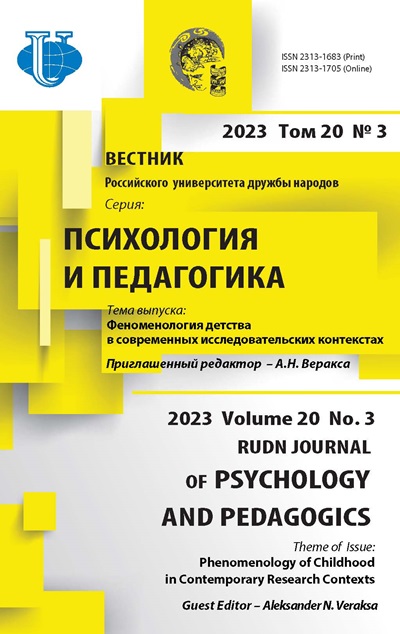Peculiarities of Coping and Mechanisms of Psychological Defense in Persons with Alcohol Dependence
- Authors: Chkhikvadze T.V1, Beliaeva E.N1
-
Affiliations:
- Peoples’ Friendship University of Russia (RUDN University)
- Issue: Vol 15, No 1 (2018)
- Pages: 94-108
- Section: PERSONALITY AND SOCIAL PSYCHOLOGY
- URL: https://journals.rudn.ru/psychology-pedagogics/article/view/18183
- DOI: https://doi.org/10.22363/2313-1683-2018-15-1-94-108
Cite item
Full Text
Abstract
The article is devoted to the study of the features of the defensive-coping behavior of alcohol dependent personality in the context of the necessity to optimize addiction therapy methods. An analysis of the range of coping strategies and mechanisms of psychological defense in alcoholism was conducted. The study involved 120 men and women between the ages of 30 and 60; 62 of them are patients with alcohol dependence, registered with the narcological clinic, and 58 people who do not have alcohol dependence. The following psychodiagnostic methods were used: “Strategic Approach to Coping Scale - SACS” (S. Hofball), “Life Style Index - LSI” (R. Plutchik, H. Kellerman & H.R. Conte). In the course of the analysis, it was found that behavioral pattern “aggressive actions” is expressed at a higher level in individuals with alcohol dependence. The leading coping strategies for both dependent respondents and the control sample are “seeking social support”, “cautious actions”, “coming into contact”. When assessing the gender characteristics of coping behavior, it was revealed that alcohol-dependent women use coping “avoidance” and “impulsive actions” more often than alcohol-dependent men. The dominant mechanisms of psychological defense for both dependent respondents and the control sample are “projection”, “intellectualization” and “negation”. There are differences between the group of respondents with alcohol dependence and the control group in the degree of tension of the defense mechanisms “substitution” and “compensation”: higher rates are observed in patients with alcoholism. The mechanism of defense “intellectualization” is more often and more intensively manifested in alcohol-dependent men, “reactive formations” - in alcoholdependent women. Identified in the course of the empirical study, the features are considered as possible “targets” for the psychological correction of an alcohol-dependent personality, its way of responding and behavioral stereotypes under stress.
About the authors
Tinatin V Chkhikvadze
Peoples’ Friendship University of Russia (RUDN University)
Author for correspondence.
Email: tv.chkhikvadze@yandex.ru
PhD in Psychology, Associate Professor, Department of Psychology and Pedagogy
Miklukho-Maklaya str., 6, Moscow, Russia, 117198Evgeniia N Beliaeva
Peoples’ Friendship University of Russia (RUDN University)
Email: trg174@gmail.com
master student, Department of Psychology and Pedagogy
Miklukho-Maklaya str., 6, Moscow, Russia, 117198References
- Baranova, O.V. (2005). Psikhologicheskie mekhanizmy formirovaniya alkogol’noi anozognozii. Narkologiya, (6), 59—60. (In Russ.).
- Bekhtel’, E.S. (1984). Psikhologicheskie zashchitnye mekhanizmy v klinike alkogolizma. Zhurnal nevrologii i psikhiatrii, 84(2), 244—248. (In Russ.).
- Bokhan, N.A., Mandel, A.I., Stoyanova, I.Ya., Mazurova, L.V., & Aslanbekova, N.V. (2013). Psychological Defense and Strategies of Coping in Alcohol Dependence and Co-Dependence in Women. Journal of Psychology & Psychotherapy, 3(5). doi: 10.4172/2161-0487.1000128.
- Bratus, B.S., & Sidorov, P.I. (1984). Psikhologiya, klinika i profilaktika rannego alkogolizma. Moscow: MSU Publ. (In Russ.).
- Chereneva, E.A. (2013). Protective Mechanisms of Behavior as Factor of Adaptive Behavior. Tomsk State Pedagogical University Bulletin, 6(134), 122—126. (In Russ.).
- Corbin, W.R., Farmer, N.M., & Nolen-Hoekesma, S. (2013). Relations Among Stress, Coping Strategies, Coping Motives, Alcohol Consumption and Related Problems: A Mediated Moderation Model. Addictive Behaviors, 38(4), 1912—1919. doi: 10.1016/j.addbeh.2012.12.005.
- Costa, R.M., & Brody, S. (2013). Immature Psychological Defense Mechanisms Are Associated with Greater Personal Importance of Junk Food, Alcohol, and Television. Psychiatry Research, 209(3), 535—539. doi: 10.1016/j.psychres.2013.06.035.
- Creswell, K.G., Chung, T., Wright, A.G.C., Clark, D.B., Black, J.J., & Martin, C.S. (2015). Personality, Negative Affect Coping, and Drinking Alone: A Structural Equation Modeling Approach to Examine Correlates of Adolescent Solitary Drinking. Addiction, 110(5), 775—783. doi: 10.1111/ add.12881.
- Dmitrieva, N.V., Sigaeva, A.V., & Prikhodchenko, O.A. (2013). Osobennosti zashchitnosovladayushchego povedeniya addiktivnoi lichnosti. Psikhoterapiya, (2), 29—33. (In Russ.).
- Haggett, A. (2015). Men, Alcohol and Coping. In: Haggett, A. A History of Male Psychological Disorders in Britain, 1945—1980 (pp. 82—98). London: Palgrave Macmillan. doi: 10.1057/9781137448880_4.
- Jones, B. (1971). Alcoholic addiction. London.
- Klubova, E.B. (1991). Issledovanie struktury zashchitnykh mekhanizmov lichnosti u bol’nykh alkogolizmom. Obozrenie psikhiatrii i med. psikhologii im. V.M. Bekhtereva, (3), 70—71. (In Russ.).
- Korolenko Ts.P., & Zav’yalov V.Yu. (1987). Lichnost’ i alkogol’. Novosibirsk: Nauka Publ. (In Russ.).
- Nemchin, T.A., & Tsytsarev, S.V. (1989). Lichnost’ i alkogolizm. Leningrad: Meditsina Publ. (In Russ.).
- Pavlov, I.S. (2012). Psikhoterapiya v praktike: tekhnologiya psikhoterapevticheskogo protsessa. Moscow: Akademicheskii prospect Publ. Kul’tura Publ. (In Russ.).
- Semenov, S.Yu. (2008). Vliyanie ispol’zovaniya koping-strategii na oshchushchenie psikhologicheskogo blagopoluchiya u zavisimykh i nezavisimykh ot psikhoaktivnykh veshchestv. Narkologiya, (4), 58—64. (In Russ.).
- Sirota, N.A. (2009). Profilaktika narkomanii i alkogolizma. Moscow: Akademiya Publ. (In Russ.)
- Sirota N.A., & Yaltonskii V.M. (2012). Primenenie i vnedrenie programm reabilitatsii i profilaktiki zavisimogo povedeniya kak aktual’naya zadacha rossiiskoi klinicheskoi psikhologii. Meditsinskaya psikhologiya v Rossii: http://mprj.ru/archiv_global/2012_2_13/nomer/nomer05.php (accessed: December 2, 2017). (In Russ.).
- Subbotina, L.Yu. (2006). Deformation of Psychological Defense in Pathologically Dependent Personality. Human Ecology, (10), 25—28. (In Russ.).
- Taner, E., Sahiner, S., & Arikan, Z. (2013). Coping Strategies for Patients with Alcohol Dependence Who Are in Remission or Not: A Controlled Study. European Psychiatry, (28), 1. doi: 10.1016/ s0924-9338(13)77158-x.
- Vasserman L.I., Eryshev O.F., Klubova E.B., Petrova N.N., Bespal’ko, I.G., Osadchii, I.M. (2005). Psikhologicheskaya diagnostika indeksa zhiznennogo stilya (Posobie dlya psikhologov i vrachei). St. Petersburg: SPbNIPNI im. V.M. Bekhtereva Publ. (In Russ.).
- Vodop’yanova, N.E. (2009). Psikhodiagnostika stressa. St. Petersburg: Piter Publ. (In Russ.).
- Walker, R., & Stephens, R.S. (2014). Protective Behavioral Strategies Mediate Problem-Focused Coping and Alcohol Use in College Students. Addictive Behaviors, 39(6), 1033—1037. doi: 10.1016/j. addbeh.2014.02.006.
- Windle, M., & Windle, R.C. (2015). A Prospective Study of Stressful Events, Coping Motives for Drinking, and Alcohol Use Among Middle-Aged Adults. Journal of Studies on Alcohol and Drugs, 76(3), 465—473. doi: 10.15288/jsad.2015.76.465.
- Yaltonskii, V.M., Sirota, N.A., Sokolova, E.T., & Viderman, N.S. (2001). Vzaimosvyaz’ kopingpovedeniya i Ya-kontseptsii u bol’nykh, zavisimykh ot alkogolya, i uslovno zdorovykh muzhchin. Rossiiskoi Federatsii. Sotsial’naya i klinicheskaya psikhiatriya, (2), 36—43. (In Russ.)
















